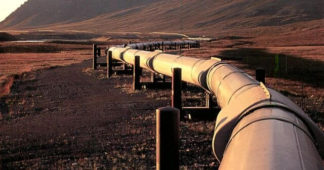Apr. 18, 2022
Groups representing German employers and unions have joined together in opposing an immediate ban on natural-gas imports from Russia, saying such a move would lead to factory shutdowns and the loss of jobs.
Rainer Dulger, chairman of the Confederation of German Employers’ Associations (BDA), and Reiner Hoffmann, chairman of the German Trade Union Confederation (DGB), issued a joint statement on April 18 as European Union leaders discuss possible new energy sanctions against Russia over its invasion of Ukraine.
“A rapid gas embargo would lead to loss of production, shutdowns, a further de-industrialization, and the long-term loss of work positions in Germany,” Dulger and Hoffmann said, according to dpa.
Ukraine’s leaders have pushed for an embargo on natural gas, saying money paid by European countries for Russian oil and gas is financing Moscow’s war against Ukraine. Europe earlier this month banned Russian coal imports beginning in August.
Dulger and Hoffmann said they worry that in the current embargo debate not enough care is being put into making sure that any sanctions are targeted and prevent harm to the economies implementing the sanctions.
The two said current proposals would harm the German economy and employment levels more than it would those same factors in Russia. The way to help Ukraine, they argued, is to make sure Germany has a stable economy and labor market.
The EU’s executive commission has outlined steps to cut the consumption of Russian gas by two-thirds by year’s end through using more pipeline gas from Norway and Azerbaijan, importing more liquefied natural gas, accelerating the deployment of wind and solar projects, and intensifying conservation efforts.
The EU’s 27 nations get around 40 percent of their natural gas from Russia and around 25 percent of their oil. Natural gas would be the most difficult do without, energy analysts say, since most of it comes by pipeline from Russia and supplies of liquefied gas, which can be delivered by ship, are limited amid strong demand worldwide.
Germany, a major importer of Russian gas and oil, has so far resisted an immediate shutoff but says it plans to phase out Russian oil by the end of the year and most Russian gas by mid-2024.
We remind our readers that publication of articles on our site does not mean that we agree with what is written. Our policy is to publish anything which we consider of interest, so as to assist our readers in forming their opinions. Sometimes we even publish articles with which we totally disagree, since we believe it is important for our readers to be informed on as wide a spectrum of views as possible.











